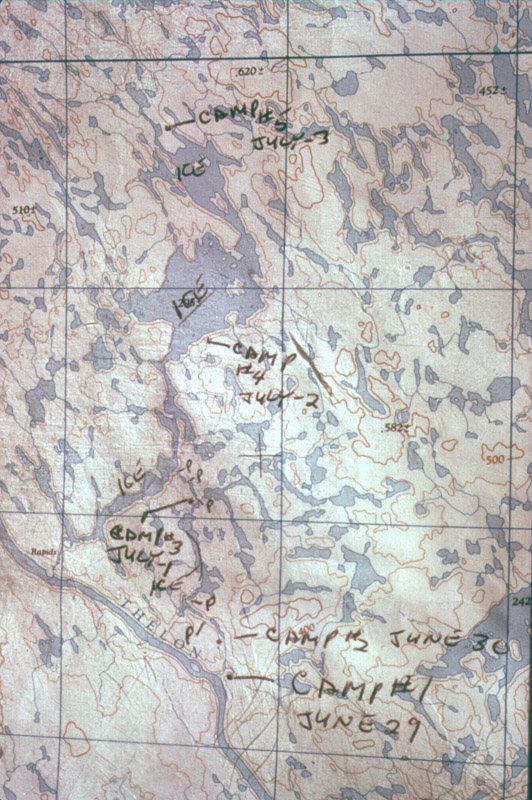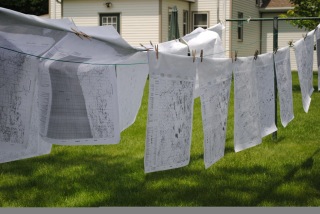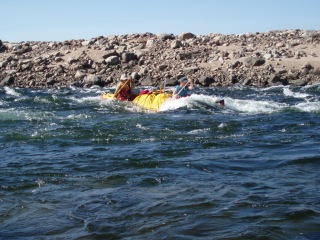Moving the canoe through arctic ice (1976). Photo courtesy of Tom Rice
From an early age, if there was one name that meant adventure to me--just as much as Davy Crockett or Daniel Boone--it was Bob O’Hara.
My uncle, Tom, a lifelong outdoorsman, went on an Arctic canoe trip with Bob in 1976. Their crew flew into Baker Lake, Nunavut, and planned to paddle for 60 days through a maze of waterways—including the Back and Thelon Rivers—to an Inuit village on the Arctic Ocean near Gjoa Haven. This was well before satellite phones or other communication options, and when they became icebound and had to arduously backtrack, they were lucky to catch a ride out on a bush plane that just happened to be on the last flight out of a remote fishing camp that was closing for the season. That was their 44th day. The stories and photographs of this trip fascinated me and filled my imagination with thoughts of paddling with Eskimos and polar bears in northern Canada.
“I remember sitting on a big rock staring into the sky while a radio blasted out the incredible news we’d landed two men on the moon.”
Since the late 60s, Bob has spent every Summer on long voyages exploring the waterways of the far north. There may be a few people alive today who have travelled as much, or more, of the northland by canoe as Bob, but it is an exclusive group for sure. When he wasn't running wild rivers in the Arctic, Bob was a high school biology teacher and active member of the Minnesota Canoe Association (MCA). Although now retired from his high school teaching, Bob still loves to teach and is known for helping others plan their big dream trips (he has shared loads of valuable advice and recommendations with me over the years). He's also still passionate about the paddling community, and for years has taken time to plan, organize, and run the MCA's "Far North Symposium."
Bob canoeing the Colville River with Nate Ptacek. Photo courtesy of Bob O'Hara
In Minnesota, canoeists can enjoy paddling more than 10,000 lakes and a multitude of rivers, but for some, like Bob, the desire to push ever northward into greater expanses of virtually untouched wilds has carried them well beyond the end of the road and into the arctic north of Canada. The Far North Symposium is their event to share information, listen to the adventures of other far north travelers, and plan new adventures. Many other people attend the Far North Symposium, not necessarily because they have any intention of spending their Summer in the far north, but simply because they love to hear a great story! I’ve attended this event year after year, and I always walk away filled not only with nuts and bolts details on how to travel and live in the remote northern wilderness, but having enjoyed the incredible presentations showcasing recent trips with wild rapids, harried bush plane flights, musk ox, polar bear attacks, accounts of phenomenal fishing, and life-changing long trips.
If you’re free Saturday, March 21, have a passion for canoe trips, want to learn more about adventuring into the arctic wilds, and live anywhere within a day’s drive of St. Paul, MN, I encourage you to make the effort to attend the Far North Symposium! You can check out the line-up of speakers and register online today (only $20 if you pre-register for the event). This year Bob will be presenting on his trip down the Colville River in Alaska, along with several other incredible expeditions.
Expedition Talk with Bob O'Hara
Linda and I had a great time sharing dinner with Bob at his home not too long ago, admiring the native artwork from his travels north, and skimming through his vast personal library of northern books and maps that he uses to plan his trips.
As always, we learned a lot from Bob during our candid conversation, and we took plenty of notes.
How did you get started with your canoe trips? Can you tell me about your early canoeing experiences?
I first discovered canoeing in Boy Scouts in 1955. It was an “ah-ha” moment for me. I’d rowed before, but here you could sit facing forward and turn it on a dime—a completely different experience than the old row boat.
My first trip to the Boundary Waters Canoe Area was in 1959 (Bob has taken well over 100 canoe camping trips in the BWCA, over 56 consecutive years!). We travelled from Moose Lake along the border to the west and back to Lake Shagwa in Ely, a total of about 125 miles. We saw one other person on that trip, a Canadian Ranger.
And my first big trip well north into Canada was in 1967 from Norway House to York Factory along the Hayes and God’s River route to Hudson Bay.
Route map for one far north trip in 1976. Photo courtesy of Tom Rice
Who taught you how to plan and take these northern trips? Did anyone help you get started with them?
Unfortunately, there really wasn’t anyone around to teach. When I first started, I was basically self taught. I’d read Calvin Rutstrum’s books and met him when he came and spoke to our Boy Scout troop. I loved his books, he had a lot of great ideas, but he was very set in the old ways. Sigurd Olson’s books were also helpful and inspiring. We would practice, make adaptations, and develop our skills and judgement over time.
There’s a continuously growing interest in bushcraft, with much of it focused on traditional skills and gear. Do you have any nostalgia for the traditional ways?
On that first trip, our gear and methods were very primitive. We wore cotton clothes. We had some wool, but not much. We slept right on the ground with cheap Dacron sleeping bags. Our cotton tent had no floor or mosquito net. We didn't have any life jackets, our paddles were too long, and an outfitter supplied us with a ton of canned foods.
Some of the old ways are fun to practice and can be sort of an adult form of play. And, there were some great woodsmanship skills. Canoe building used to be a big activity in the club, but now most people don’t have the woodworking skills or the time for it.
But when you’re running a serious expedition, safety and practicality are foremost. There’s a reason gear has evolved—modern fabrics are superior, lighter, and work much better. Staying dry is really nice and can mean the difference between life and death in the far north.
Any other gear advice?
Bob's van loaded with valuable gear and supplies for a long journey into the far north. Photo courtesy of Bob O'Hara
You should have a very high-quality tent, rain gear, a good sleeping bag, a high-quality PFD (which you wear!), appropriately sized paddles, and a canoe that can handle the load and the river.
Your gear must be in good working condition. If you're using stoves, they must be tested, and you should know how to perform field repairs. Due to the harsh UV in the Arctic, I would change tents every 3-4 trips.
Your packs need to keep your gear and necessities dry. Whatever you choose to use, you have to be confident your pack won't fail you. I use barrels, dry bags, and Duluth packs—they each have their place.
How about menu planning?
I keep it simple. Three solid meals a day. All of our meals are quick to prepare, nothing exotic. Variety comes from changing flavors. Survey your crew beforehand to see if there are any food concerns. We usually catch so many fish—more than we can eat—so we end up throwing them back.
How is doing a popular “near north” wilderness, such as the Boundary Waters or Allagash River, different than a “far north” trip? If someone dreams of stepping up to bigger adventure, how would you recommend they go about it?
Bob water-seals his maps and dries them in the sun before a big trip. Photo courtesy of Bob O'Hara
The planning process is more or less the same, but the answers are often much harder to get. Issues such as how to get in and out, bush flights, information on the route, potential and common far north issues (such as dealing with ice as late as July), the length of time, provisioning, putting a team together might all be new to someone and can seem daunting to figure out.
The remoteness, potential for severe conditions, and distance from help also make for a riskier trip. There's an element of danger in almost everything we do, but on these trips the stakes are higher.
But the main thing is, just do it! Serendipity played a large part in leading me into a lifetime of northern trips. You don’t need to reinvent the wheel. A little research will get you going, or you can find a veteran and pick their brain or join their group.
What are the skills someone should work to acquire for wilderness canoe camping?
Navigating the whitewaters on the Baillie River. Photo courtesy of Bob O'Hara
Common sense is at the top of the list! You also have to be a camper. If living in the outdoors is not second nature to you, you’ll be in trouble on a long northern trip. You need paddling skills—at least to the level of the water where you’ll be traveling. Not all northern trips involve whitewater, but paddling skills are still very important.
The best way is to start on short trips near home and learn by doing.
You were the one planning, organizing, and leading these trips in the field. What about skills for a trip leader?
As a group leader, you have to look ahead at what problems could happen and have a solution ready. At times, you have to be the one who says, "My way or the highway." You never compromise when safety is an issue, and you always err on the side of caution.
You should have people in the group with good outdoor skills, including first aid, navigation, cooking, etc.
And don't forget to look for common interests when putting a crew together. Find out why people want to go, identify potential conflict, and either resolve it, or don’t take the person. If you have to be a peacemaker, you chose the wrong crew.
Any advice on travelling in bear country? Everyone loves bear stories!
Respect bears at all times. Be proactive. Don’t do lots of frying where you camp. NO garabage—eat all your food. NO FOOD IN TENTS!
I’ve had all kinds of bears in camp, including one day on the upper side of Hudson’s Bay where we had NINE polar bears! In those areas, you also need to have bear protection. Carry bear spray, bear bangers, an air horn, and if you’re proficient, possibly a shotgun with rubber bullets and slugs.
Do you have a favorite river? One that you’d want to do again?
Kuujjua, on Victoria Island. I’ve done it twice, and I would do it again in a heartbeat.
Canoeing Across the Arctic
Bob O'Hara's passion for canoe trips has taken him all across northern Canada and Alaska! Check out the rivers Bob has canoed in his life:
Armark River
Arrowsmith River
Back River
Baillie River
Berens River
Caniapiscau River
Caribou River
Clarke River
Colville River
Coppermine River
Deer River
Dubawnt River
Elk River
Ellice River
Hanbury River
Hayes/God’s River
Hood River
Horton River
Kazan River
Kunwak River
Kuujjua River
Lockhart River
Mara/Burnside River
Meadowbank River
Nahanni River
Nanook River
Owl River
Quoich River
Soper River
Thelon River
Thlewiaza River
With such passion for canoeing and the outdoors, it's not a surprise that Bob is working to share these experiences and encourage other people to make their own with the Far North Symposium!






